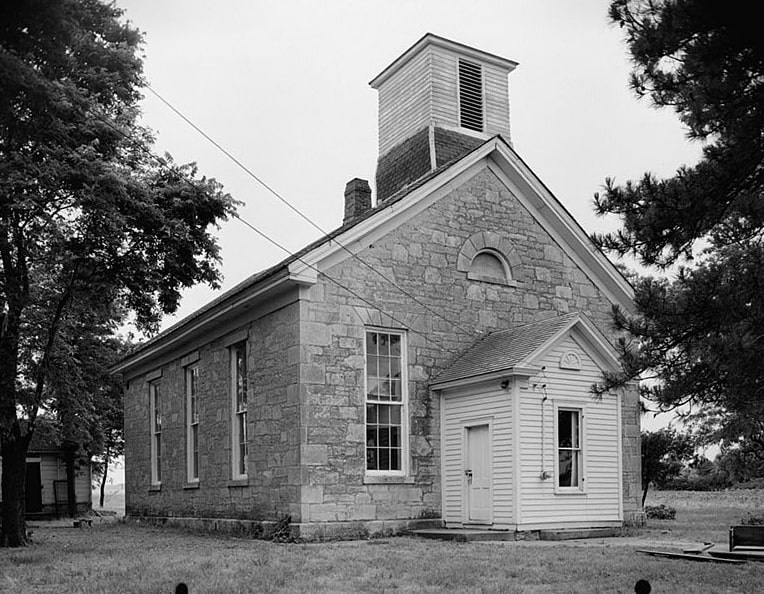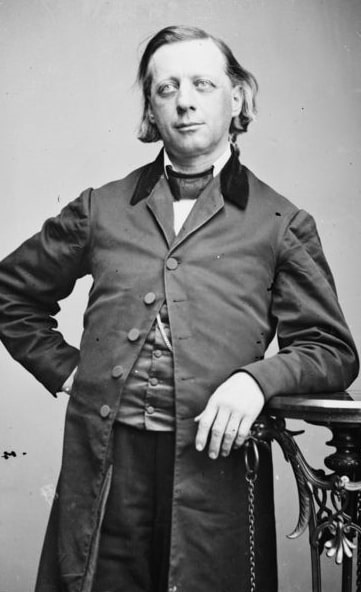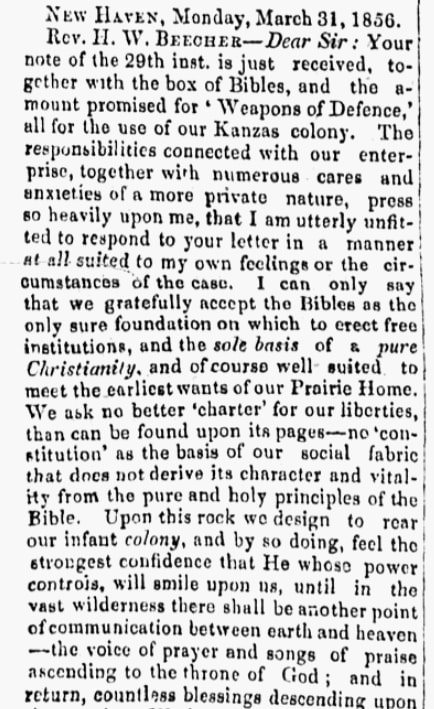The Connecticut Kansas Colony, an anti-slavery group led by Charles B. Lines in New Haven, Connecticut, was gathering supplies and funds in 1855 for their immigration to the Kansas Territory. The group knew they faced great danger: deadly clashes had erupted in “Bleeding Kansas” as pro- and anti-slavery forces fought to determine if Kansas would enter the Union as a slave or free state. The determined pioneers would need Bibles for their Kansas crusade – but they would need guns, too.

To their rescue came Henry Ward Beecher, a popular preacher and leading abolitionist. (His sister, Harriet Beecher Stowe, wrote the abolitionist novel Uncle Tom’s Cabin.) He raised funds to purchase supplies for the “Free Staters” heading to Kansas, including Bibles and advanced Sharps rifles. As he explained in a letter to Lines, “There are times when self-defence is a religious duty.” In fact, these precision rifles came to be called “Beecher’s Bibles.”

The Colony members were delighted with Beecher’s contributions to their cause, and the group was sometimes called the “Beecher Bible and Rifle Colony.”
Here is the letter Lines wrote to Beecher expressing the Colony’s thanks.

Here is a transcription of this article:
New Haven, Monday, March 31, 1856.
Rev. H. W. Beecher
Dear Sir: Your note of the 29th inst. is just received, together with the box of Bibles, and the amount promised for “Weapons of Defence,” all for the use of our Kansas colony. The responsibilities connected with our enterprise, together with numerous cares and anxieties of a more private nature, press so heavily upon me, that I am utterly unfitted to respond to your letter in a manner at all suited to my own feelings or the circumstances of the case. I can only say that we gratefully accept the Bibles as the only sure foundation on which to erect free institutions, and the sole basis of a pure Christianity, and of course well suited to meet the earliest wants of our Prairie Home. We ask no better “charter” for our liberties, than can be found upon its pages – no “constitution” as the basis of our social fabric that does not derive its character and vitality from the pure and holy principles of the Bible. Upon this rock we design to rear our infant colony, and by so doing, feel the strongest confidence that He whose power controls, will smile upon us, until in the vast wilderness there shall be another point of communication between earth and heaven – the voice of prayer and songs of praise ascending to the throne of God; and in return, countless blessings descending upon the people. We hope, also, that from this settlement there will go out an influence for good over the State, that shall to some extent be felt in promoting civil order, just and equal laws, a correct idea of the rights of man, and the value of free institutions.
But in the judgment of a large majority of our people, there are always circumstances connected with the founding of new States, that render it wise and proper, even for peaceable men, while they rely upon the Providence of God for protection, to provide themselves also with the means of rendering such aid available. We rely upon God for a crop of corn, but only in connection with breaking up the prairie and sowing the seed. Our fathers came to this land emphatically as religious, and yet they brought with them “weapons of defence,” and they found use for them; and it does not yet appear that any of the conservative pro-slavery journals in our Northern cities have discovered any “treason” in their conduct. Recent events have shown that emigration to Kansas in this enlightened age and country has been attended by circumstances clearly indicating that there is not even here exemption from the common necessity. We therefore accept the weapons, also, and like our fathers, we go with the Bible, to indicate the peaceful nature of our mission, and the harmless character of our company, and a weapon to teach those who may be disposed to molest us (if any such there be), that while we determine to do only that which is right, we will not submit tamely to that which is wrong. We wish nevertheless to have it distinctly understood, that we do not anticipate the occurrence of any contingency that will render it necessary to use these deadly weapons for our protection, and that they cannot be so used while in our hands except in the last resort, and for the defence of those rights and liberties that are dearer than life itself.
It only remains for me to tender to you, and through you, to those who have cooperated with you in these manifestations of sympathy with our enterprise, our sincere thanks.
In great haste, your truly,
C. B. Lines,
In behalf of the Company
Note: An online collection of newspapers, such as GenealogyBank’s Historical Newspaper Archives, is not only a great way to learn about the lives of your ancestors – the old newspaper articles also help you understand American history and the times your ancestors lived in, and the news they talked about and read in their local papers.
